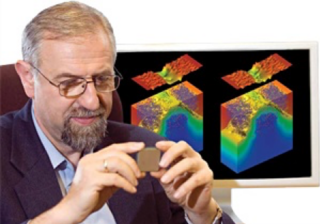 W
WAsen Asenov is a Bulgarian scientist and entrepreneur in the field of microelectronics and device modelling and one of the pioneers in Technology Computer Aided design (TCAD). Currently he is the James Watt Chair in Electrical Engineering at the University of Glasgow and the Leader of the Glasgow Device Modeling Group.
 W
WAntonio Bicchi is an Italian scientist interested in robotics and intelligent machines. He is professor at the University of Pisa and Senior Researcher at Istituto Italiano di Tecnologia in Genoa. He is an Adjunct Professor at the School of Biological and Health Systems Engineering of Arizona State University in Tempe, Arizona, USA. He is a Fellow of IEEE since 2005, and received the IEEE Saridis Leadership Award and the “Ordine del Cherubino” from University of Pisa in 2019.
 W
WRainer Blatt is a German-Austrian experimental physicist. His research centres on the areas of quantum optics and quantum information. He and his team performed one of the first experiments to teleport atoms, the other was done at NIST in Boulder Colorado. The reports of both groups appeared back-to-back in Nature.
 W
WAlberto Broggi is General Manager at VisLab srl and a professor of Computer Engineering at the University of Parma in Italy.
 W
WThe Center for Telematics is a German research institute located in the City of Würzburg in northern Bavaria; although its main research topic is on robotics and telematics, it is also among the leading institutes in Bavaria designing and building small satellites (cubesats) focusing in formation flying. In 2018, a German-Israeli research team led by the Center for Telematics received a research prize from the European Research Council to build ten micro-satellites for exploring the clouds and improve global climate models. The Center for Telematics has also collaborated closely with the University of Würzburg on the development of the OBC, as well as the attitude determination sensor suite and control system of the UWE-3 and UWE-4 CubeSat, the latter launched on 27 December 2018 as a secondary payload on a Soyuz-2.
 W
WGianni Dal Maso is an Italian mathematician who is active in the fields of partial differential equations, calculus of variations and applied mathematics.
 W
WPrimavera De Filippi is a legal scholar, Internet activist and artist, whose work focuses on the blockchain, peer production communities and copyright law. She is permanent researcher at the CNRS and Faculty Associate at the Berkman Klein Center for Internet & Society at Harvard University. She is author of the book Blockchain and the Law published by Harvard University Press. As an activist, she is part of Creative Commons, the Open Knowledge Foundation and the P2P Foundation, among others.
 W
WCamillo De Lellis is an Italian mathematician who is active in the fields of calculus of variations, hyperbolic systems of conservation laws, geometric measure theory and fluid dynamics. He is a permanent faculty member in the School of Mathematics at the Institute for Advanced Study. He is also one of the two managing editors of Inventiones Mathematicae.
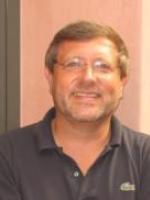 W
WGustavo Deco is an Argentinian and Italian professor and scientist. He serves as Research Professor at the Catalan Institution for Research and Advanced Studies and Full Professor (Catedratico) at the Pompeu Fabra University, where he is Director of the Center of Brain and Cognition and head of the Computational Neuroscience Group. In 2001 Deco was awarded the international prize of Siemens "Inventor of the Year" for his contributions in statistical learning, models of visual perception, and fMRI based diagnosis of neuropsychiatric diseases..
 W
WBarry J. Dickson is an Australian neurobiologist who studies the development of neuronal networks in the fruit fly Drosophila melanogaster. Dickson is a group leader at the Janelia Research Campus of the Howard Hughes Medical Institute in Loudoun County, Virginia and a former scientific director of the Research Institute of Molecular Pathology (IMP) in Vienna, Austria.
 W
WRichard Salisbury Ellis is Professor of Astrophysics at the University College London. He previously served as the Steele Professor of Astronomy at the California Institute of Technology (Caltech). He was awarded the 2011 Gold Medal of the Royal Astronomical Society.
 W
WThe European Research Council (ERC) is a public body for funding of scientific and technological research conducted within the European Union (EU). Established by the European Commission in 2007, the ERC is composed of an independent Scientific Council, its governing body consisting of distinguished researchers, and an Executive Agency, in charge of the implementation. It forms part of the framework programme of the union dedicated to research and innovation, Horizon 2020, preceded by the Seventh Research Framework Programme (FP7). The ERC budget is over €13 billion from 2014 – 2020 and comes from the Horizon 2020 programme, a part of the European Union's budget. Under Horizon 2020 it is estimated that around 7,000 ERC grantees will be funded and 42,000 team members supported, including 11,000 doctoral students and almost 16,000 post-doctoral researchers.
 W
WAlessio Figalli is an Italian mathematician working primarily on calculus of variations and partial differential equations.
 W
WWilliam Tecumseh Sherman Fitch III is an American evolutionary biologist and cognitive scientist at the University of Vienna where he is co-founder of the Department of Cognitive Biology.
 W
WPascal Fua is a computer science professor at EPFL. He received an engineering degree from École Polytechnique, Paris, in 1984 and a Ph.D. in Computer Science from the University of Orsay in 1989. He joined EPFL in 1996. Before that, he worked at SRI International and at INRIA Sophia-Antipolis as a computer scientist.
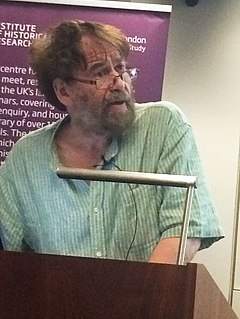 W
WSimon David Goldhill, FBA is Professor in Greek literature and culture and fellow and Director of Studies in Classics at King's College, Cambridge. He was previously Director of Centre for Research in the Arts, Social Sciences, and Humanities (CRASSH) at the University of Cambridge, succeeding Mary Jacobus in October 2011. He is best known for his work on Greek tragedy.
 W
WJonathan Michael Gregory is a climate modeller working on mechanisms of global and large-scale change in climate and sea level on multidecadal and longer timescales at the Met Office and the University of Reading.
 W
WSamer Hassan is a computer scientist, activist and researcher, focused on the use of decentralized technologies to support commons-based collaboration. He is Associate Professor at Universidad Complutense de Madrid (Spain) and Faculty Associate at the Berkman Klein Center for Internet & Society at Harvard University. He is the recipient of an ERC Grant of 1.5M€ with the P2P Models project, to research blockchain-based decentralized autonomous organizations for the collaborative economy.
 W
WAvishai Henik is an Israeli neurocognitive psychologist who works at Ben-Gurion University of the Negev (BGU). Henik studies voluntary and automatic (non-voluntary/reflexive) processes involved in cognitive operations. He characterizes automatic processes, and clarifies their importance, the relationship between automatic and voluntary processes, and their neural underpinnings. Most of his work involves research with human participants and in recent years, he has been working with Archer fish in order to examine evolutionary aspects of various cognitive functions.
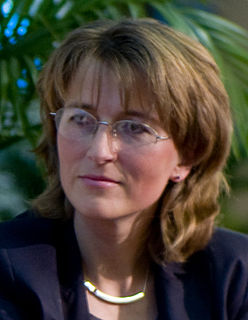 W
WMonika Henzinger is a German computer scientist, and is a former director of research at Google. She is currently a professor at the University of Vienna. Her expertise is mainly on algorithms with a focus on data structures, algorithmic game theory, information retrieval, search algorithms and Web data mining. She is married to Thomas Henzinger and has three children.
 W
WHenrik Koch is a Danish scientist. His field is theoretical chemistry. He is Full Professor at Scuola Normale Superiore di Pisa in Italy.
 W
WLászló Lovász is a Hungarian-American mathematician and professor emeritus at Eötvös Loránd University, best known for his work in combinatorics, for which he was awarded the 2021 Abel Prize jointly with Avi Wigderson. He was the president of the International Mathematical Union from 2007 to 2010 and the president of the Hungarian Academy of Sciences from 2014 to 2020.
 W
WWolfgang Lutz is an Austrian demographer specializing in demographic analysis and population projection. He founded the Wittgenstein Centre for Demography and Global Human Capital in 2010 - a collaboration between IIASA, the Vienna Institute of Demography (VID) of the Austrian Academy of Sciences, and the WU-Vienna University of Economics and Business. In October 1985 he joined IIASA to lead the World Population Program. He has been director of VID since 2002 as well as a Full Professor of Applied Statistics (part-time) at Vienna University since 2008. He also holds the position of Professorial Research Fellow at the Oxford Martin School for 21st Century Studies.
 W
WGiuseppe Mingione is an Italian mathematician who is active in the fields of partial differential equations and calculus of variations.
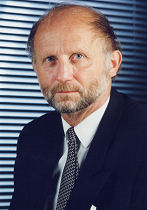 W
WAchim Müller is a German chemist. He is Professor Emeritus at the Faculty of Chemistry, University of Bielefeld.
 W
WAlexander van Oudenaarden is a Dutch biophysicist and systems biologist. He is a leading researcher in stem cell biology, specialising in single cell techniques. In 2012 he started as director of the Hubrecht Institute and was awarded two times an ERC Advanced Grant, in 2012 and in 2017. He was awarded the Spinoza Prize in 2017.
 W
WFrançois Pachet is a French scientist, composer and director of the Spotify Creator Technology Research Lab. Before joining Spotify he led Sony Computer Science Laboratory in Paris. He is one of the pioneers of computer music closely linked to artificial intelligence, especially in the field of machine improvisation and style modelling. He has been elected ECCAI Fellow in 2014.
 W
WManuel Pérez García is Associate Professor at the Department of History of Shanghai Jiao Tong University. He is also Distinguished Researcher at Pablo de Olavide University (UPO) of Seville (Spain). From 2013 to 2017 he was Associate Professor at the School of International Studies, Renmin University of China.
 W
WStefanie Petermichl is a German mathematical analyst who works as a professor at the University of Toulouse, in France. Topics of her research include harmonic analysis, several complex variables, stochastic control, and elliptic partial differential equations.
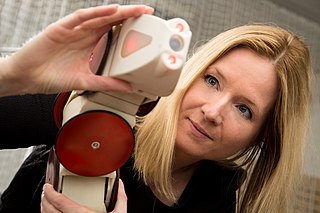 W
WKristin Ytterstad Pettersen is a Norwegian engineer whose research involves nonlinear control theory and its application to controlling the motion of both watercraft and snakebots. She is a professor of engineering cybernetics at the Norwegian University of Science and Technology, and the founder of Eelume AS.
 W
WWalter Pohl is an Austrian historian who is Professor of Auxiliary Sciences of History and Medieval History at the University of Vienna. He is a leading member of the Vienna School of History
 W
WTheodorus "Theo" Henricus Maria Rasing is a Dutch professor of experimental physics at Radboud University Nijmegen. His expertise lies in the field of magneto-optics. He was a winner of the 2008 Spinoza Prize.
 W
WSiegfried Selberherr is an Austrian scientist in the field of microelectronics. He is a professor at the Institute for Microelectronics of the Technische Universität Wien . His primary research interest is in modeling and simulation of physical phenomena in the field of microelectronics.
 W
WPascale Senellart is a French physicist who is a Senior Researcher at the French National Centre for Scientific Research and Professor at the École Polytechnique. She has worked on quantum light sources and semiconductor physics. She was awarded the CNRS Silver Medal in 2014 and made Fellow of The Optical Society in 2018.
 W
WEhud Shapiro is a multi-disciplinary scientist, artist, entrepreneur and Professor of Computer Science and Biology at the Weizmann Institute of Science. With international reputation, he made fundamental contributions to many scientific disciplines. Ehud was also an Internet pioneer, a successful Internet entrepreneur, and a pioneer and proponent of E-democracy. Ehud is the founder of the Ba Rock Band and conceived its original artistic program. He is a winner of two ERC Advanced Grants.
 W
WSaharon Shelah is an Israeli mathematician. He is a professor of mathematics at the Hebrew University of Jerusalem and Rutgers University in New Jersey.
 W
WAndrew Stuart Tanenbaum, sometimes referred to by the handle ast, is an American-Dutch Physicist and Professor emeritus of Computer Science at the Vrije Universiteit Amsterdam in Netherlands. He is best known as the author of MINIX, a free Unix-like operating system for teaching purposes, and for his computer science textbooks, regarded as standard texts in the field. He regards his teaching job as his most important work. Since 2004 he has operated Electoral-vote.com, a website dedicated to analysis of polling data in federal elections in the United States.
 W
WIva Marija Tolić is a Croatian biophysicist, known for her work on the microtubule cytoskeleton and associated motor proteins. She is currently Senior Research Group Leader and Professor of Biology at the Ruđer Bošković Institute in Zagreb, Croatia.
 W
WAnton Zeilinger is an Austrian quantum physicist who in 2008 received the Inaugural Isaac Newton Medal of the Institute of Physics (UK) for "his pioneering conceptual and experimental contributions to the foundations of quantum physics, which have become the cornerstone for the rapidly-evolving field of quantum information". Zeilinger is professor of physics at the University of Vienna and Senior Scientist at the Institute for Quantum Optics and Quantum Information IQOQI at the Austrian Academy of Sciences. Most of his research concerns the fundamental aspects and applications of quantum entanglement.
 W
WGünter Matthias Ziegler is a German mathematician who has been serving as president of the Free University of Berlin since 2018. Ziegler is known for his research in discrete mathematics and geometry, and particularly on the combinatorics of polytopes.